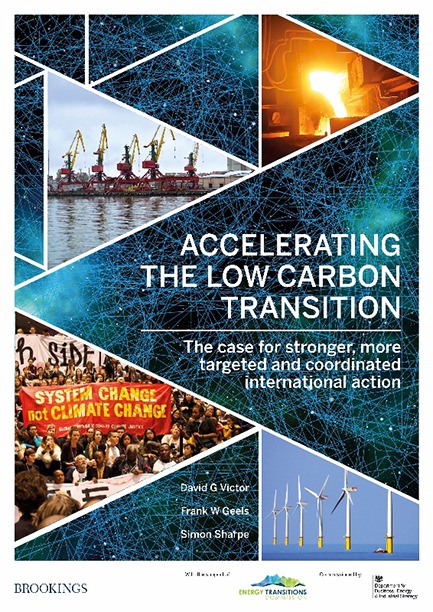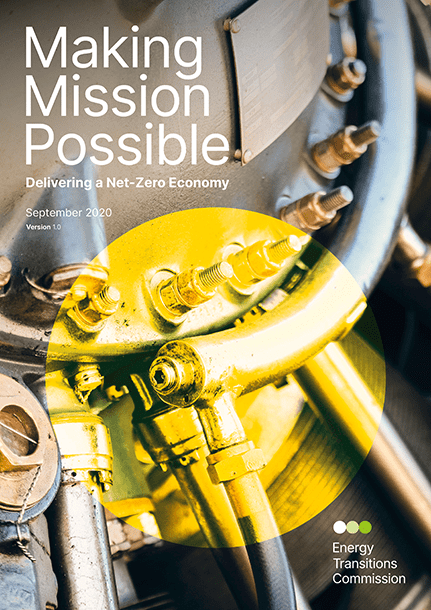Accelerating the low carbon transition
November 2019
This report is authored by David G. Victor, Frank W. Geels and Simon Sharpe, with the support of the Energy Transitions Commission. This report is for the governments and businesses that are interested in accelerating deep decarbonisation of the world economy. It aims to highlight where their actions can have the greatest impact, by bringing together knowledge of how technology transitions happen and how international cooperation has succeeded in the past, and applying these insights to the main greenhouse gas emitting sectors. In each of these sectors, the report identifies points of leverage for coordinated international action to accelerate low-carbon transitions. In comparison with previous reports, what is new is a focus on the processes of change, rather than on the end goal.

Publication overview
Meeting climate goals requires ‘rapid and far-reaching transitions in energy, land, urban and infrastructure (including transport and buildings) and industrial systems. These systems transitions are unprecedented in terms of scale, but not necessarily in terms of speed…’ How can this be achieved?
This report is for the governments and businesses that are interested in accelerating deep decarbonisation of the world economy. It aims to highlight where their actions can have the greatest impact, by bringing together knowledge from three areas:
- An understanding of how technology transitions happen – drawing on lessons from historical shifts such as from horses to cars, coal to gas, and wells to piped water systems;
- An understanding of how international cooperation has succeeded in the past – looking at what has worked for problems in trade, security, and the environment – and what this means for how coordinated action can steer and accelerate technological transitions;
- The application of these insights to the main greenhouse gas emitting sectors, focussed particularly on identifying points of leverage for coordinated international action to accelerate low-carbon transitions.
In comparison with previous reports, what is new is a focus on the processes of change, rather than on the end goal.
Key messages of the report
- Nationally: focus policy on system transitions. Stopping emissions requires fundamental innovation, rapid diffusion of new technologies, and the reshaping of markets and socioeconomic systems. This requires actions far beyond simply putting a price on carbon or adopting bold emissions goals. A more targeted, hands-on and strategic approach to policymaking is required to reconfigure the technologies, business models, infrastructure and markets in each of the greenhouse gas-emitting economic sectors.
- Internationally: coordinate action within sectors. It is within economic sectors or systems that new technologies can be created and diffused eventually to reshape the social and economic activities of which they are a part. This process depends on the actions of policymakers, firms, consumers and civil society actors who, in today’s economy, are connected globally. Coordinated international action, appropriate to the phase of the transition, can accelerate this process: by identifying viable technologies more quickly; by increasing incentives for investment and economies of scale; and by levelling playing fields so that first-movers are not held back by the constraints of competitiveness. This means that while formal climate diplomacy tends to be organised around countries, the real focus both for governments and for industry should be coordinating actions in sectors or systems.
Much more effort is needed to convene the key actors in each sector in order for the goals of the Paris Agreement to be met. Alongside the policy actions for decarbonisation, a strategic commitment to institution-building is therefore the single most important activity that can be undertaken by any government wishing to lead the global response to climate change.
Authors and contributors
- David G Victor, Director of the Laboratory on International Law and Regulation and a professor at the School of Global Policy and Strategy at UC San Diego
- Frank W Geels, Professor of System Innovation and Sustainability at the Alliance Manchester Business School at the University of Manchester
- Simon Sharpe, Research Fellow and Honorary Lecturer at the Institute for Innovation and Public Purpose at University College London
- The Energy Transitions Commission provided substantial analysis in support of the sections on trucks, shipping, aviation, steel, cement and plastics, building on work done for the Mission Possible report and subsequent discussions with industry.




